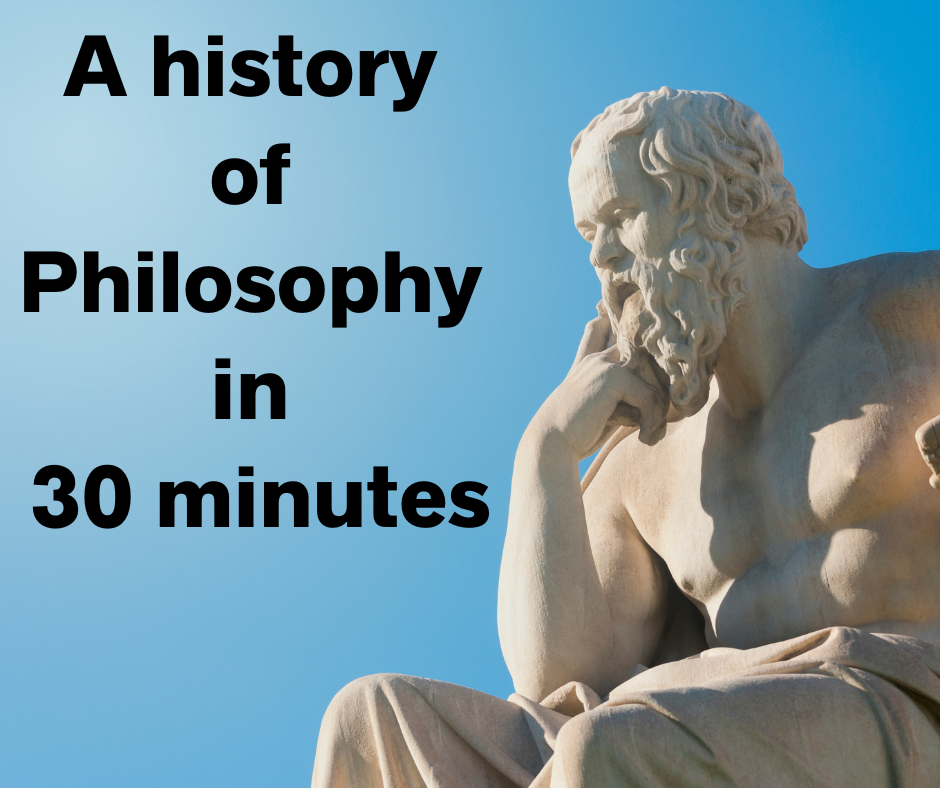
“I podcast, therefore I am”, said one of the great philosophical thinkers of our time.
In today’s podcast, we’re going to try and give you a complete history of philosophy in about 30 minutes – from Socrates to Jean-Paul Sartre – without all the boring bits!
This isn’t the first time we’ve attempted to cover a really big topic in one short podcast.
A History of Britain in 20 minutes: https://www.inglespodcast.com/153
A History of the English Language in 20 Minutes: https://www.inglespodcast.com/320
A Brief History of Phrasal Verbs: https://www.inglespodcast.com/331
A History of American English in 20 Minutes: https://www.inglespodcast.com/335
A history of Philosophy in 30 minutes
Philosophy is the study of big questions about life, knowledge, and the universe. It helps us understand how we think and why we believe certain things. There are many important movements and philosophers in the history of philosophy. Here are some of the most influential ones:
Ancient Greek Philosophy: These guys started it all! Thinkers like Socrates, Plato, and Aristotle asked questions about knowledge, happiness, and how to live a good life. They laid the groundwork for Western philosophy.
Greek philosophy
Socrates: Known for asking questions to help people think deeply about their beliefs. This method is called the Socratic method.
Plato: A student of Socrates who wrote about justice, beauty, and the ideal state. He founded the Academy in Athens.
Aristotle: A student of Plato who wrote about many subjects, including science, ethics and politics. He believed in studying the natural world.
Eastern Philosophy
Confucius in China focused on social harmony and good government.
Buddha in India explored achieving peace and freedom from suffering.
Medieval Philosophy mixed Greek ideas with religion.
St. Augustine: Combined Christian theology with Platonic ideas. He wrote about the nature of God and the human soul.
Thomas Aquinas: Integrated Aristotle’s philosophy with Christian doctrine. He argued that reason and faith can coexist.
Renaissance and Enlightenment
The Renaissance brought a renewed focus on human potential. The enlightenment put emphasis on science and reason.
René Descartes: Famous for the quote “I think, therefore I am.” He focused on doubt and the certainty of one’s own existence. He questioned everything to find what we can truly know.
John Locke: Believed in natural rights and the idea that the mind is a blank slate at birth. His ideas influenced modern democracy.
Immanuel Kant: Explored how we understand the world and morality. He proposed that we have a duty to follow moral laws.
Francis Bacon: Emphasized the importance of natural philosophy, guided by scientific method.
Voltaire (real name: François-Marie Arouet) emphasized logic and individual rights. He used reason and logic to question everything, not just blindly accepting what people told him. He encouraged people to think for themselves freely, which wasn’t always popular back then!
19th-Century Philosophy:
Karl Marx: Critiqued capitalism and wrote about class struggle. He believed in the importance of economic systems in shaping society.
Friedrich Nietzsche: Questioned traditional values and religion. He introduced the somewhat controversial idea of the “Übermensch” or “superman”, much promoted after his death in Nazi Germany.
20th-Century Philosophy:
Jean-Paul Sartre: An existentialist who believed that people create their own meaning in life. He believed in individual freedom and responsibility.
Ludwig Wittgenstein: Studied language and its limits. He argued that many philosophical problems arise from misunderstandings of language.
Michel Foucault: Examined how power and knowledge are connected. He studied institutions like prisons and hospitals.
Philosophical Movements
Stoicism: Focuses on personal virtue and wisdom. Stoics believe in accepting what we cannot change.
Existentialism: Emphasizes individual freedom and responsibility. Existentialists explore the meaning of life and human existence.
Empiricism: Emphasizes knowledge through sensory experience. Key figures include Francis Bacon, John Locke and David Hume.
Rationalism: Believes that reason is the primary source of knowledge. Key figures include Descartes and Kant.
Analytic Philosophy: Concentrates on language and logic. It aims to clarify philosophical problems through analysis of the language we use.
Continental Philosophy: Includes a range of approaches from countries like Germany and France, often focusing on history, culture, and society. It looks at how we experience the world.
…and now it’s your turn to practise your English.
Send us a voice message. https://www.speakpipe.com/inglespodcast
Send us an email with a comment or question to [email protected] or [email protected]
If you’re a Spanish speaker and you want to study for free, visit the mansioningles website and for paid eBooks and audios for self-study check out the online store: https://store.mansioningles.net/
Thank you to our Patreon supporters. Join our Patreon program for as little as $1.50 per month and you get instant access to the transcriptions of this podcast. https://www.patreon.com/inglespodcast
Welcome to our new Patreon supporters who have joined us this month:
Jessica Negrier
Ronaldo Nino
Walter Zangue
In next week’s episode: From Cases to Clutches: Bag Vocabulary Unpacked!
If you enjoyed this podcast, please tell your friends.
The music in this podcast is by Pitx. The track is called ‘See You Later’




